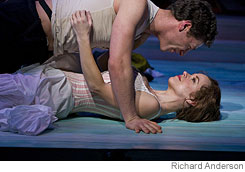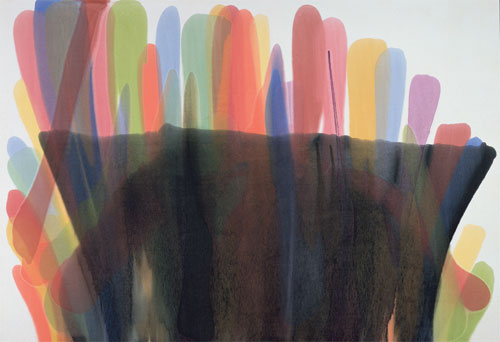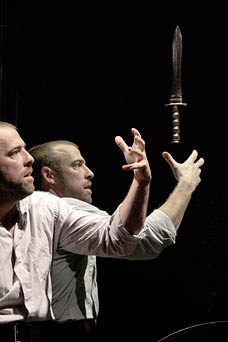Last week I discovered the show Damages and watched all 13 episodes of Season 1 over a marathon of on-the-couch dinners and before-bed cups of tea (see Top 5 at right). One of the best parts of the show is Ted Danson’s character of billionaire Arthur Frobisher, the defendant in an Enron-esque class-action lawsuit brought by the former employees of his bankrupt company. Danson was nominated for a Golden Globe for his part, and if the world were a right one, his giant block of a brow and his white, wolfish chompers also would have gotten nods.
As his case comes closer to trial, Frobisher is taking a p.r. beating in the media and, against the advice of his attorney, he arranges to have his biography written. Now Frobisher is very much Forster’s man on the golf course, and it’s clear he expects this project to be a glossy piece of hagiography, one that will chart his self-made rise to captain of industry, his triumph over childhood dyslexia, his family values, etc. etc. In due time, a biographer is procured — a nervous plug of a guy named George, “a fellow from Yale, writes fiction no one reads but he’s one hell of a biographer” — and the project commences. Yet as the interviews between writer and subject continue Frobisher’s confidence visibly wavers as he becomes more nervous about how his biographer (and hence history) will judge him. He pays a midnight visit to his biographer’s tiny city apartment to drum up camaraderie. The attempt fails, and, desperate, Frobisher tries one last sally:
FROBISHER: Tell me about your book.
GEORGE: My novel?
FROBISHER: Sorry, your novel.
GEORGE (looking pained & emo): It’s hard to describe.
FROBISHER: Just tell me what it’s about, will you?
GEORGE: On the face of it, it’s a love story. It’s about nostalgia and how that affects our core relationships —
FROBISHER (incredulous): Jesus, George! I mean, that sounds like crap! Are you kidding me? Look what you’re doing here? (motions around apartment) You’re living in — You’re sleeping on a futon. C’mon! Of course you’re writing about my life. You don’t have one!
A short scene but the “On the face of it, it’s a love story” line and the sputtering “You’re sleeping on a futon” (I do!) are killers.
Archives for March 2008
CAAF: Loose notes
“If you ask one type of man, ‘What does a novel do?’ he will reply placidly: ‘Well–I don’t know–it seems a funny sort of question to ask–a novel’s a novel–well, I don’t know–I suppose it kind of tells a story, so to speak.’ He is quite good-tempered and vague, and probably driving a motor bus at the same time and paying no more attention to literature than it merits. Another man, whom I visualize as on a golf-course, will be aggressive and brisk. He will reply: ‘What does a novel do? Why, it tells a story of course, and I’ve no use for it if it didn’t. I like a story. Very bad taste on my part, but I like a story. You can take your art, you can take your literature, you can take your music, but give me a good story. And I like a story to be a story, mind, and my wife’s the same way.’ And a third man he says in a sort of dropping regretful voice, ‘Yes–oh dear, yes–the novel tells a story.’ I respect and admire the first speaker. I detest and fear the second. And the third is myself. Yes–oh, dear, yes–the novel tells a story . . . The more we look at the story (the story that is a story, mind), the more we disentangle it from the finer growth it supports, the less we shall find to admire. It runs like a backbone–or may I say a tapeworm, for its beginning and end are arbitrary . . . It is a narrative of events arranged in their time sequence–dinner coming after breakfast, Tuesday after Monday, decay after death and so on. Qua story, it can only have one merit: that of making the audience wonder what happens next. And conversely it can only have one fault: that of making the audience not want to know what happens next. These are the only two criticisms that can be made on the story that is a story . . . When we isolate the story like this and hold it out on the forceps–wriggling and interminable, the naked worm of time–it presents an aspect both unlovely and dull. But we have much to learn from it.”
E.M. Forster, Aspects of the Novel, as quoted and elided by Samuel R. Delany in About Writing
THE METROPOLITAN OPERA GOES TO THE MOVIES
“Watching a well-directed high-definition digital telecast of an opera on a movie-house screen puts you within arm’s length of the singers. (One of the cameras is actually mounted on a remote-controlled dolly placed on the lip of the stage.) In a large house like the Met, all but a few seats are far from the stage, meaning that you have to use opera glasses to see the singers’ faces. Not so on screen…”
PLAY
The Four of Us (City Center, 131 W. 55, extended through May 18). Prodigy playwright Itamar Moses’ latest is a sharp-witted study of two young writers whose friendship is endangered when they succeed at different rates of speed. It has the feel of a first-rate indie flick, enhanced by the intimacy of an off-Broadway stage production. Smart, crisp, touching (TT).
CAAF: Morning coffee
• David Orr’s review of Elegy, a book of poetry by Mary Jo Bang, explores the difficulties of transforming great grief into art.
• After a couple clunkers, it sounds as if Salman Rushdie’s latest novel, The Enchantress of Florence, is a return to form. Ursula K Le Guin praises it to the “brilliant, fascinating” moon.
• Once more with feeling!: Three different accounts of the recent Buffy reunion panel in L.A. Each one contains different morsels of trivia, backstage gossip, and reads on the personalities, so if you’re a fan you’ll want to read all three. If you’re not a fan, you’ll, um, just want to skip the whole thing. (Via.)
TT: Eight days a week
• FRIDAY Our Girl in Chicago knocks on my door at midnight, having braved a snowstorm to fly to Manhattan to celebrate her birthday. We stay up way too late talking.
 • SATURDAY To Baltimore via train for CenterStage’s very sexy revival of Stephen Sondheim’s A Little Night Music, preceded by pizza and gelato at Iggie’s. At the theater we meet fellow Sondheim buff Laura Lippman, whose new book has just come out, then pick up her husband David Simon after the show for dinner and conversation. I shamefacedly admit to David (who is incredibly nice about it) that I’ve never seen The Wire, but that OGIC is giving me the first season on DVD as a belated birthday present. Exhausted, Our Girl and I nap on the train after the show, then stay up way too late talking.
• SATURDAY To Baltimore via train for CenterStage’s very sexy revival of Stephen Sondheim’s A Little Night Music, preceded by pizza and gelato at Iggie’s. At the theater we meet fellow Sondheim buff Laura Lippman, whose new book has just come out, then pick up her husband David Simon after the show for dinner and conversation. I shamefacedly admit to David (who is incredibly nice about it) that I’ve never seen The Wire, but that OGIC is giving me the first season on DVD as a belated birthday present. Exhausted, Our Girl and I nap on the train after the show, then stay up way too late talking.
• SUNDAY Brunch at Madaleine Mae, the fancy new southern-style restaurant on my corner, whose owners hope to succeed where three previous dining establishments have failed since I moved here five or so years ago. The grits and biscuits are excellent. Our Girl gives me a big hug and a copy of Rachel Ries‘ new CD and leaves for the airport, toting a bagful of warm H&H bagels. Chicago is a great town for hot dogs, but they don’t get bagels there.
I spend the afternoon straightening pictures, listening to a new CD of Grieg and Saint-Saëns playing their own music, and reading a book about Chekhov. At seven I go to City Center to see The Four of Us, Itamar Moses’ latest play, accompanied by my new friend Rosalie Sullivan, who sang in the workshop for The Letter.
• MONDAY I spend the whole day writing an essay for Commentary about The Magical Chorus, Solomon Volkov’s new study of Russian art and culture in the twentieth century. Dinner with an old friend who has good news–she’s pregnant–followed by two hours of intensive editing on the Commentary essay. Early(ish) to bed after calling Mrs. T in Connecticut and my mother in Missouri. For some reason I’ve been waking up at six-thirty every morning, alarm or no alarm, so I figure I’d better go with the flow or pay the price.
• TUESDAY Another deadline, this one for Saturday’s Wall Street Journal “Sightings” column about my trip to Philadelphia to see the movie-house simulcast of the Metropolitan Opera’s new production of Peter Grimes. The column comes easily, leaving me with enough free time to work in a trip to the gym before meeting Paul Moravec at his apartment to hear him play through his sketches for the seventh and eighth scenes of The Letter.
To Broadway after dinner for a press preview of Gypsy, where I run into Chris Jones, my opposite number at the Chicago Tribune, who is in town for Gypsy and In the Heights. I quiz him about what shows I should see when Mrs. T and I come to Chicago in June. Then I spot my companion for the evening, escort her into the St. James Theatre, and discover that our seats are five rows from the stage, meaning that listening to Patti LuPone sing “Rose’s Turn” feels like sitting in a wind tunnel.
“You know what Gypsy is?” my friend says as we file out of the theater three hours later. “It’s the Platonic ideal of the golden-age Broadway musical.”
“Can I steal that?” I ask.
“I want points,” she replies.
 • WEDNESDAY To Washington, D.C., via the Acela Express for the March meeting of the National Council on the Arts. I write Friday’s drama column on the train, e-mail it to the Journal from the lobby of Union Station, then take a cab to the Smithsonian Museum of American Art to see Color as Field, a touring exhibition curated by Karen Wilkin about which I’m thinking of writing a column for the Journal.
• WEDNESDAY To Washington, D.C., via the Acela Express for the March meeting of the National Council on the Arts. I write Friday’s drama column on the train, e-mail it to the Journal from the lobby of Union Station, then take a cab to the Smithsonian Museum of American Art to see Color as Field, a touring exhibition curated by Karen Wilkin about which I’m thinking of writing a column for the Journal.
From there I go straight to the National Endowment for the Arts, where I spend the rest of the afternoon in conference, then board a bus for Kennedy Center to see August Wilson’s Jitney with my fellow council members. I arrive at the hotel at ten o’clock, check in, call Mrs. T and my mother, and fall into bed.
 • THURSDAY I wake at six-thirty and spend an hour writing before going down to breakfast, then take a cab to the NEA and spend the next nine hours reviewing a thousand (count ’em, a thousand) grant applications and discussing various other arts-related matters with the council and permanent staff. Lunch consists of sandwiches snarfed down at the conference table. The meeting runs long, forcing me to sneak out to meet Megan McArdle for dinner and Macbeth at the Folger Theatre.
• THURSDAY I wake at six-thirty and spend an hour writing before going down to breakfast, then take a cab to the NEA and spend the next nine hours reviewing a thousand (count ’em, a thousand) grant applications and discussing various other arts-related matters with the council and permanent staff. Lunch consists of sandwiches snarfed down at the conference table. The meeting runs long, forcing me to sneak out to meet Megan McArdle for dinner and Macbeth at the Folger Theatre.
• FRIDAY I read today’s drama column over breakfast in the hotel restaurant, whose buffet features smoked salmon, one of my food groups. It’s the first time in months that I’ve looked at a copy of the Journal on paper (I now read newspapers and magazines online or not at all).
Back to the NEA for one more meeting, a public session at which the NCA votes on grant applications and listens to a presentation about jazz by Paquito d’Rivera and Gunther Schuller. Schuller and I have spoken briefly on the phone but never met face to face, so I spend a few minutes after the meeting chatting with him about my Louis Armstrong biography, in which he figures prominently. Then I go to Union Station and catch the next train to New York, catching up on my accumulated e-mail during the three-hour trip.
At home I open my accumulated snail mail, correct the galleys of my Commentary essay, and grab a quick nap. In the evening I take a blogfriend to a press preview of South Pacific at Lincoln Center. Afterward we wolf down burgers across the street at P.J. Clarke’s and catch up on recent events. She goes home and blogs about the performance. I call Mrs. T and fall into bed.
• SATURDAY Up at six-thirty, arrgh. I spend the morning writing a book review, working on expense reports, and running errands. At three o’clock I board a train bound for Hartford and start reading the newly published final installment of Henry-Louis de La Grange’s multi-volume Gustav Mahler biography, which is 1,758 pages long (the last volume, not the whole thing!).
Mrs. T picks me up at the station and delivers a sternly worded ultimatum: no more work until Monday, or else. I do as I’m told.
TT: Almanac
“Chekhov’s way is the way of Russian freedom, the embodiment of that Russian democracy, true and humane, which never materialized.”
Vasily Grossman, Life and Fate
DVD
Damages (Season 1). This show has it all: Smart scripts, stylish direction, and a phenomenal cast anchored by Glenn Close. Not to mention murder, skullduggery, and noir action galore. Yet despite a fistful of Golden Globe nominations (and a Best Actress award for Close) this FX series still seems to be flying under the radar. With Season 2 not scheduled to air until January 2009, now’s the perfect time to catch up. Close plays Patty Hewes, a high-profile litigator who is gunning for Arthur Frobisher (Ted Danson), a billionaire CEO accused of emptying his company’s retirement coffers. Patty Hewes’ protégé, Ellen Parsons (Rose Byrne), is the young lamb/ first-year associate who ends up on the dark side of the looking glass (CAAF).
